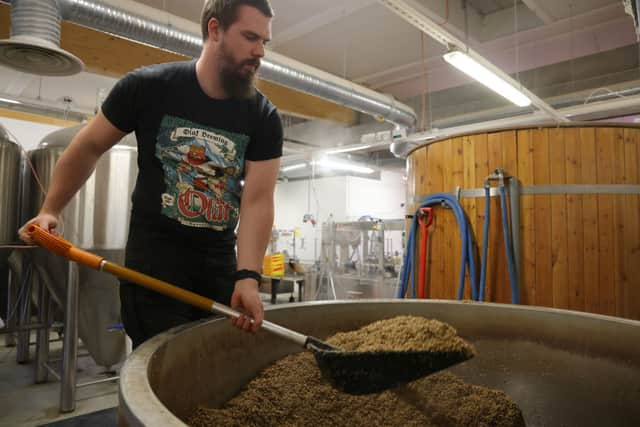What is the average price of a pint? Will cost of pints of beer go up 2022 - UK energy crisis impact explained
and live on Freeview channel 276
The UK cost of living crisis has forced prices across the UK economy to rise to their highest levels for 40 years.
This inflation is being driven in large part by energy bills and the soaring cost of food and drink, all of which is being driven directly by the Russia-Ukraine war.
Advertisement
Hide AdAdvertisement
Hide AdIt has led the bosses of several key hospitality chains to warn of mass pub closures in an open letter to the government published on Tuesday (30 August).
Part of the problem facing pubs and bars is the price of beer, which looks set to rise yet further in the coming months.


So how much does a pint cost - and why has it gone up so much?
Here’s what you need to know.
Why is the price of a pint of beer increasing?
There are several reasons why pints of beer are going up in price.
Advertisement
Hide AdAdvertisement
Hide AdAll of them are directly or indirectly as a result of the Russia-Ukraine war.


Energy bills
Because Russia is the world’s second largest producer of natural gas - a key resource for power and electricity production - prices have rocketed since it became subject to sanctions by western governments.
Its own threats (and actions) to cut off Europe’s gas supplies have only worsened the situation.
It means that not only are energy bills soaring for the general public, but pubs and breweries are also struggling to keep up with energy costs.
Advertisement
Hide AdAdvertisement
Hide AdSome have reported their tenants’ energy bills have quadrupled.


While the situation means pubs profits are being eaten into at best - or decimated at worst - it also means brewers are having to push up prices.
"All through the brewing process we’re either heating or cooling at some point," Fergus Fitzgerald from Suffolk brewery Adnams told the East Anglian Daily Times last week.
"We are seeing substantial energy costs coming through. And it is a big chunk of our of the cost of making beer and not just for us, but the cost of the things we buy."
CO2 supply crisis
Advertisement
Hide AdAdvertisement
Hide AdThe energy crisis has also had an impact on a key component of beer-making - carbon dioxide.
CO2 provides the bubbles that give both alcoholic and soft drinks their fizz.
It is produced as a by-product of ammonia fertiliser production - an energy-intensive process for which natural gas makes up 60% to 80% of production costs.
On 24 August, the UK’s only CO2 supplier CF Industries announced it would be temporarily closing its factory because gas prices had made fertiliser production “uneconomical”.
Advertisement
Hide AdAdvertisement
Hide AdWhile the full implications of this decision are still unknown, the shutdown could prove disastrous for the food and drink supply chain as a whole.
The cost of ingredients
As well as energy-related pressures, brewers are having to contend with high ingredient costs.
Barley has rocketed in price as a result of the war in Ukraine.
Ukraine is a major producer of barley, but has been unable to export or grow as much as usual due to the Russian invasion and subsequent blockade of the country’s Black Sea ports.
Advertisement
Hide AdAdvertisement
Hide AdWhile the UK does not import much barley from the Eastern European country, the knock-on price impacts of the conflict have been felt in the markets.


Another key ingredient - hops - has also risen in price.
British growers have reported fuel costs have doubled, while worker wages have increased 15% as the sector tries to attract more staff.
Before the war, the UK was heavily reliant on Ukrainian workers to pick and process hops.
How much could the price of a pint of beer rise?
According to research from consultancy CGA reported by the Guardian in June 2022, the average UK price of a pint has already risen by more than 70% since 2008 from £2.30 to £3.95.
Advertisement
Hide AdAdvertisement
Hide AdEven since 2020 average prices have risen by 7%, CGA said, with Marstons raising prices by 8% in March 2022 and Greene King pubs increasing them by 5% this year.
There have been several indications in recent weeks that pubs and bars may be considering passing even more of their costs onto consumers.
Last week, Adnams said the impact of the energy crisis and the CO2 shutdown could see pints go up by around 50p.
Meanwhile, Octopus Energy, Greg Jackson, gace a catastrophic illustration of the situation to the BBC Today programme on 22 August.
He said that if the price of beer had gone up by the same amount as gas prices, getting a pint would now cost £25.
Comment Guidelines
National World encourages reader discussion on our stories. User feedback, insights and back-and-forth exchanges add a rich layer of context to reporting. Please review our Community Guidelines before commenting.
